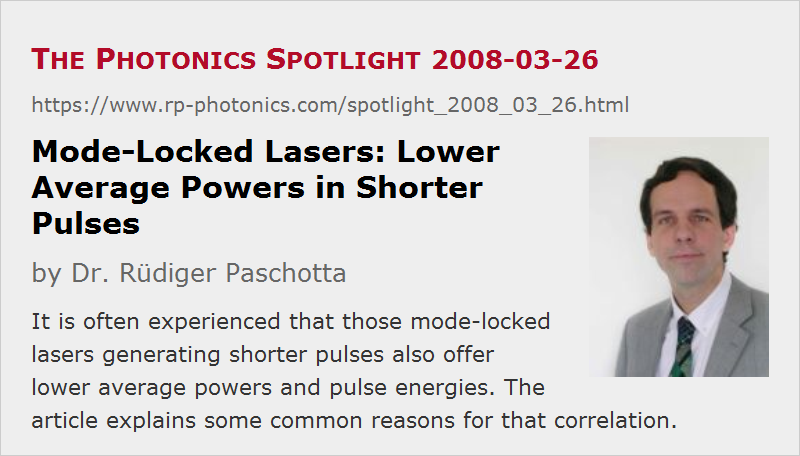Mode-Locked Lasers: Lower Average Powers in Shorter Pulses
Posted on 2008-03-26 as a part of the Photonics Spotlight (available as e-mail newsletter!)
Permanent link: https://www.rp-photonics.com/spotlight_2008_03_26.html
Author: Dr. Rüdiger Paschotta, RP Photonics Consulting GmbH
Abstract: It is often experienced that those mode-locked lasers generating shorter pulses also offer lower average powers and pulse energies. The article explains some common reasons for that correlation.

Ref.: encyclopedia articles on mode-locked lasers, ultrafast lasers, ultrashort pulses
It is very common that those mode-locked lasers generating the shortest pulses tend to offer lower average output powers and pulse energies. This could be surprising, since there is no direct relation between the average power capability and the pulse duration. However, there are various reasons behind the mentioned correlation. Here are some examples:
- Shorter pulses have a larger optical bandwidth, so that a gain media with a larger gain bandwidth are required. Unfortunately, such media tend to have a lower thermal conductivity. This is not surprising if they are glasses: the random order in a glass increases spectral broadening of electronic transitions, while also disturbing the flow of heat (phonons). Even for crystalline media, a broader gain bandwidth very often comes together with poor thermal properties.
- An increased emission bandwidth of a gain medium also usually implies lower peak cross sections. This means that the sigma–tau product is reduced, which tends to reduce the power efficiency. Furthermore, lower cross sections lead to a higher tendency for Q-switching instabilities, and measures used to keep those under control can often further degrade the power efficiency.
- Shorter pulses lead to higher peak powers (for a given pulse energy) and thus to stronger nonlinear effects. This can limit the pulse energy and peak power.
These are just some typical issues, which introduce trade-offs between different performance parameters of a laser design. Any laser design involves many different aspects with many more or less obvious relations between those, and any dropped requirement (such as a particularly short pulse duration) may allow the designer to shift certain properties so that better performance in other aspects can be achieved. And of course the opposite holds as well: demanding more on one side can compromise other features – at least when the overall design is optimized, so that no room for general improvement is wasted anywhere.
This article is a posting of the Photonics Spotlight, authored by Dr. Rüdiger Paschotta. You may link to this page and cite it, because its location is permanent. See also the RP Photonics Encyclopedia.
Note that you can also receive the articles in the form of a newsletter or with an RSS feed.
Questions and Comments from Users
Here you can submit questions and comments. As far as they get accepted by the author, they will appear above this paragraph together with the author’s answer. The author will decide on acceptance based on certain criteria. Essentially, the issue must be of sufficiently broad interest.
Please do not enter personal data here; we would otherwise delete it soon. (See also our privacy declaration.) If you wish to receive personal feedback or consultancy from the author, please contact him e.g. via e-mail.
By submitting the information, you give your consent to the potential publication of your inputs on our website according to our rules. (If you later retract your consent, we will delete those inputs.) As your inputs are first reviewed by the author, they may be published with some delay.
 |



If you like this page, please share the link with your friends and colleagues, e.g. via social media:
These sharing buttons are implemented in a privacy-friendly way!